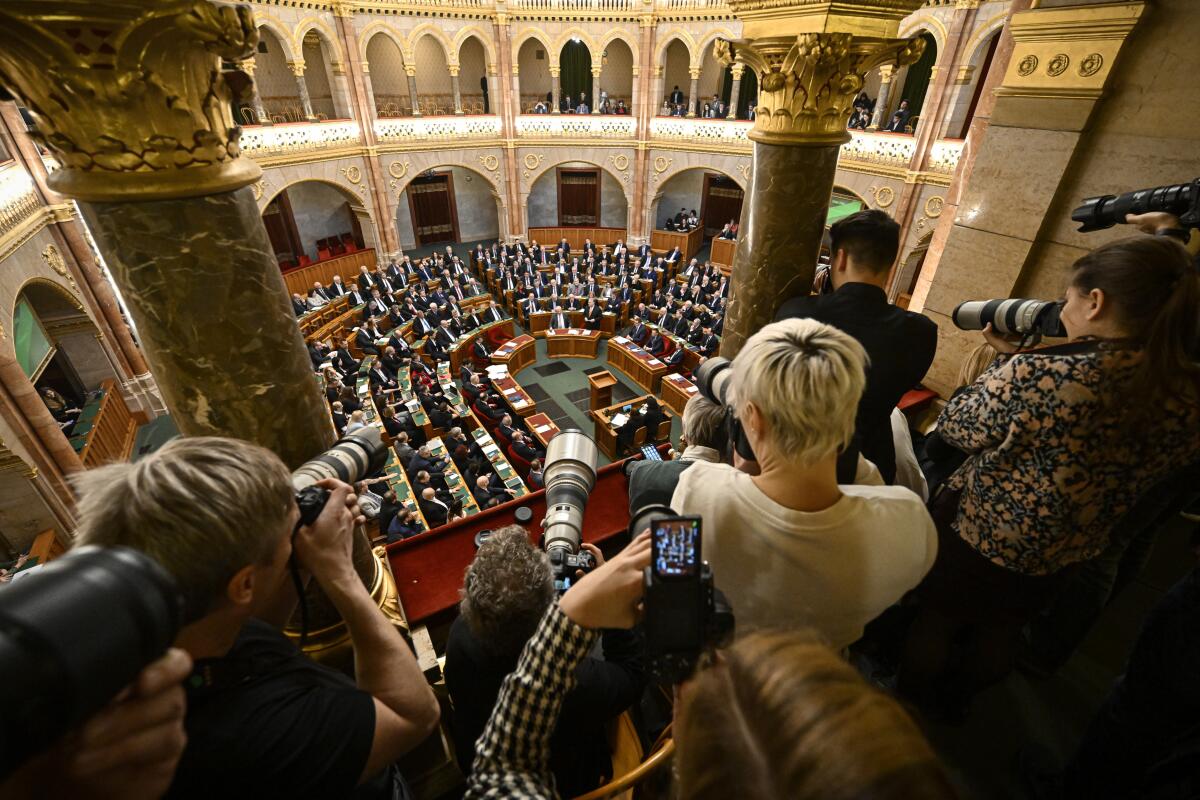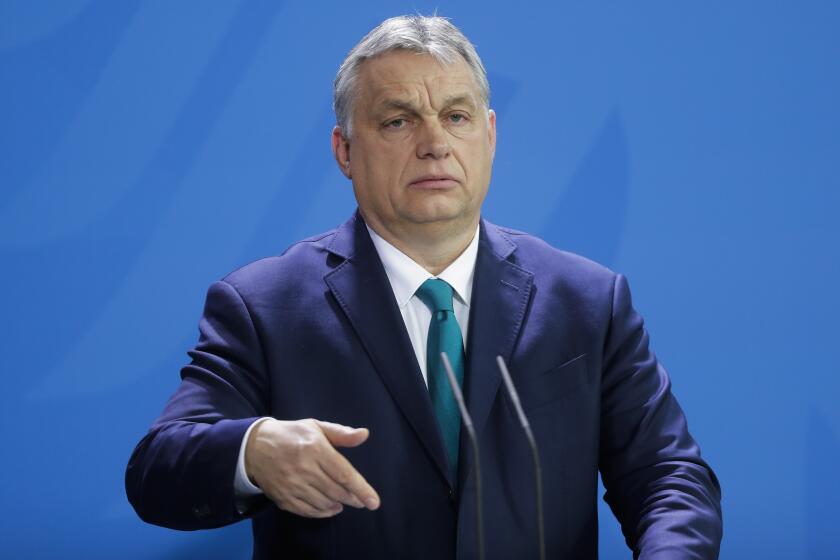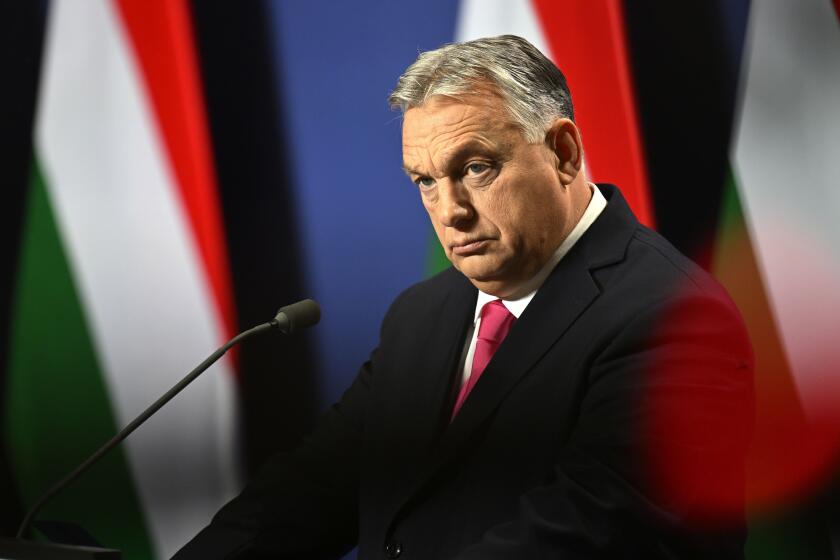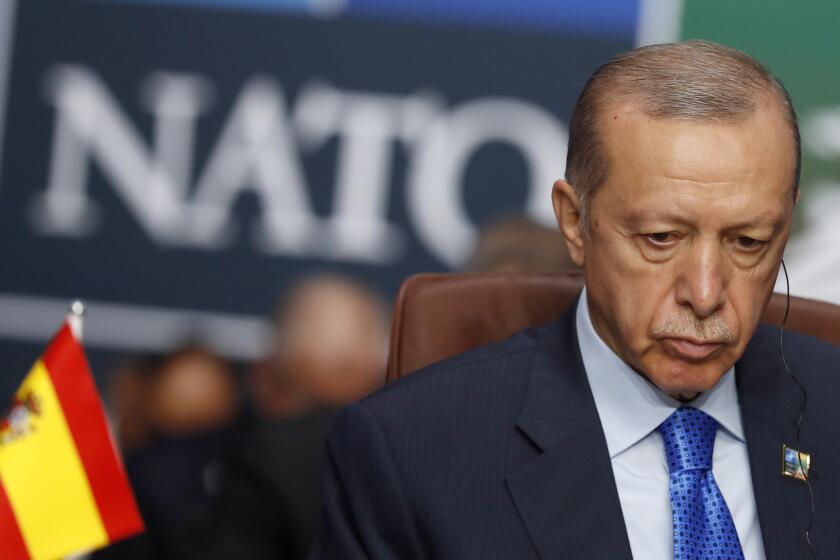Hungary’s parliament ratifies Sweden’s NATO bid, clearing the final obstacle to membership

- Share via
BUDAPEST, Hungary — Hungary’s parliament voted Monday to ratify Sweden’s bid to join NATO, bringing an end to more than 18 months of delays that have frustrated the alliance as it seeks to expand in response to Russia’s war in Ukraine.
The vote, which passed with 188 votes for and six against, came as a culmination of months of wrangling by Hungary’s allies to convince its nationalist government to lift its block on Sweden’s membership. The government of Prime Minister Viktor Orbán submitted the protocols for approving Sweden’s entry into NATO in July 2022, but the matter had stalled in parliament over opposition by governing party lawmakers.
Unanimous support among all NATO members is required to admit new countries, and Hungary is the last of the alliance’s 31 members to give its backing since Turkey ratified the request last year.
Swedish Prime Minister Ulf Kristersson called it “a historic day.”
“We stand ready to shoulder our share of the responsibility for NATO’s security,” Kristersson wrote on X, formerly known as Twitter.
The Hungarian parliament has refused to hold a vote on Sweden’s bid to join NATO, further delaying the Nordic country’s inclusion in the alliance.
Orbán, a right-wing populist who has forged close ties with Russia, has said that criticism of Hungary’s democracy by Swedish politicians had soured relations between the two countries and led to reluctance among lawmakers in his Fidesz party.
But the vote Monday removed the final membership hurdle for Sweden which, along with neighboring Finland, first applied to join the alliance in May 2022, just a few months after the start of Russia’s full-scale invasion of Ukraine.
Addressing lawmakers before the vote, Orbán said: “Sweden and Hungary’s military cooperation and Sweden’s NATO accession strengthen Hungary’s security.”
Orbán criticized Hungary’s European Union and NATO allies for placing increased pressure on his government in recent months to move forward on bringing Sweden into the alliance.
“Several people tried to intervene from the outside in the settling of our disputes [with Sweden], but this did not help but rather hampered the issue,” Orbán said. “Hungary is a sovereign country, it does not tolerate being dictated by others, whether it be the content of its decisions or their timing.”
Hungary’s nationalist government, after holding up a vote on Sweden’s membership in NATO for more than 18 months, appears ready to agree to the move.
Last weekend, a bipartisan group of U.S. senators visited Hungary and announced it would submit a joint resolution to Congress condemning Hungary’s alleged democratic backsliding and urging Orbán’s government to immediately lift its block on Sweden’s trans-Atlantic integration.
But on Friday, Swedish Prime Minister Kristersson met with Orbán in Hungary’s capital where they appeared to reach a decisive reconciliation after months of diplomatic tensions.
Following their meeting, the leaders announced the conclusion of a defense industry agreement that will include Hungary’s purchase of four Swedish-made JAS 39 Gripen jets and the extension of a service contract for its existing Gripen fleet.
Orbán said the additional fighter jets “will significantly increase our military capabilities and further strengthen our role abroad” and will improve Hungary’s ability to participate in joint NATO operations.
Here’s a look at the issues that have delayed Sweden’s entry into NATO, why Turkey finally agreed to the bid and what to expect next.
“To be a member of NATO together with another country means we are ready to die for each other,” Orbán said. “A deal on defense and military capacities helps to reconstruct the trust between the two countries.”
Monday’s vote on Sweden’s NATO accession was just one matter on a busy agenda for lawmakers in the Hungarian parliament. A vote was also held on accepting the resignation of President Katalin Novák, who stepped down earlier this month in a scandal over her decision to pardon a man convicted of covering up a string of child sexual abuses.
After accepting Novák’s resignation, lawmakers are expected to confirm Tamás Sulyok, the president of Hungary’s Constitutional Court, as the country’s new president. He is set to formally take office March 5.
Some opposition parties have said they will not participate in a vote to confirm a new president and have called for direct presidential elections. But Sulyok was nominated by Orbán’s Fidesz party, which has a two-thirds majority in parliament and is expected to easily approve his presidency.
A presidential signature is needed to formally endorse the approval of Sweden’s NATO bid, which is expected within the next few days.
More to Read
Sign up for Essential California
The most important California stories and recommendations in your inbox every morning.
You may occasionally receive promotional content from the Los Angeles Times.













